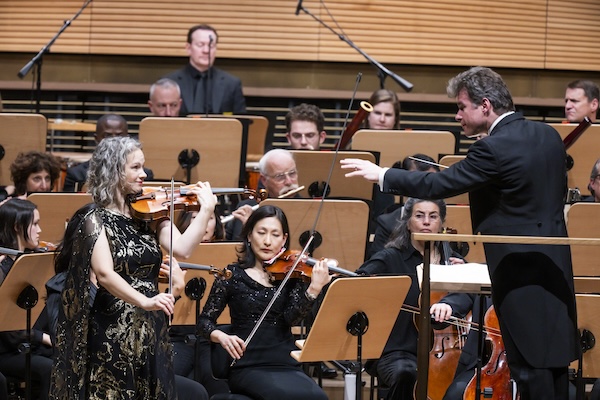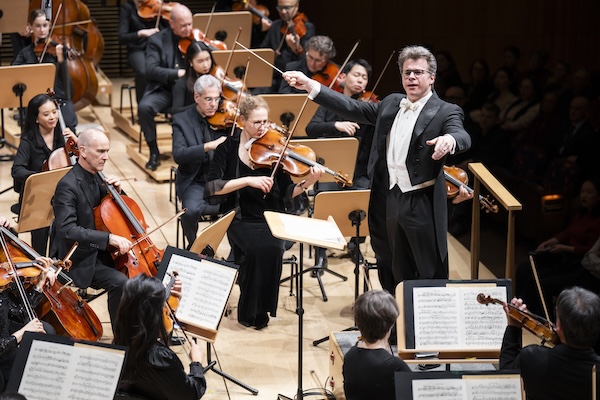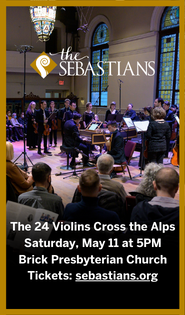Hahn receives Avery Fisher Prize, shows why with fantastical Prokofiev

The Czech conductor Jakub Hrůša led the New York Philharmonic Thursday in colorful works by Samuel Coleridge-Taylor and Bartók. But the night belonged to Hilary Hahn.
The American violinist teamed with Hrůša for a brilliant and fanciful performance of Prokofiev’s Violin Concerto No. 1, then stuck around for a solo encore and a brief ceremony, at which she was awarded the Avery Fisher Prize.
Hahn became just the 26th recipient of the prestigious award in its 49-year history. The prize goes “to solo instrumentalists who have demonstrated outstanding artistic achievement and leadership in classical music,” as identified by a recommending panel that reads like a who’s-who of classical executants and executives in the U.S. (Besides soloists, the Emerson and Kronos string quartets have also received the prize.)
With her outstanding performances and recordings, creative commissioning projects, and candid presence on the internet, Hahn would seem to have satisfied the prize’s criteria several times over.
The prize, which comes with a cash award of $100,000, was announced from the stage of David Geffen Hall by Deborah Borda, chair of the Avery Fisher Artist Program and former CEO of the New York Philharmonic, accompanied by her successor, Gary Ginstling.
No pressure or anything, but the festive audience was primed to hear top-drawer Prokofiev from the honoree. She delivered handsomely—fast or humorous when called for, but always with an eye on the concerto’s essentially lyrical spirit.
Sonata architecture never felt more airy than this work’s first movement, especially as executed by the silvery-toned Hahn and Hrůša’s exquisitely balanced orchestra. The violin’s opening song led to vigorous assertions and a light whir of fast string-crossing before the music settled gently to earth.
The composer marked the Scherzo “Vivacissimo,” and he might have added “leggierissimo,” as Hahn’s violin skittered dizzily amid chattering high woodwinds, then danced in ghostly phrases. Some beefy bow strokes and a sudden loud finish kept the listener guessing.
The peripatetic finale took a leisurely stroll through a fragrant garden, pausing to savor a duet for the soloist and a graceful clarinet, a dancing dialogue with harp and woodwinds, an expressive snatch of song, and a sudden gust of wind in the leaves, before floating away in a mist of trills.
Hahn’s songful encore, “Through My Mother’s Eyes” by Steven Banks, began vibrantly in double stops, but like the concerto closed pianissimo.
Conductor Hrůša was a discreet and artful partner to Hahn in weaving the spell of the concerto. Through the rest of the program, it was almost as if he was still yielding the floor to the night’s honoree, reluctant to put his stamp on the orchestral scores before him.

From Thursday’s performance of Coleridge-Taylor’s Ballade in A minor for Orchestra, it was hard to tell what, other than proficiency in orchestration, prompted Elgar to call this African-British composer “far and away the cleverest fellow going amongst the young men.” Elgar’s publisher Jaeger remarked on the “wonderful freshness” Coleridge-Taylor brought to Edwardian English music, but little of that was evident in Hrůša’s straight-through reading of the score. The piece’s narrative drama—agitated opening, soaring lyrical theme, forte climax—was duly observed, but without a detectable purpose or point of view.
Similarly, accuracy in execution was the chief virtue of Hrůša’s rendition of Bartók’s Concerto for Orchestra. Smartly coordinated, it checked all the boxes in the score, but was short on the juice of life. In the “Game of Pairs” movement, the instrumental mock-duels were more straight-faced than playful, and the brass chorale lacked pomposity. The cry of the strings that cut through the central Elegy was forte all right, but not anguished.
Contrasts of character and mood are what lift the listener through this three-quarter-hour piece. The “Interrupted Intermezzo”—gloomy, charming, jeeringly sarcastic–is particularly rich in such opportunities, but Hrůša availed himself of few.
An exciting finale can rescue all, and this one did on Thursday, with fast, accurate playing. It could have used more sparkle in the fugato and more contrast in the episodes, but the madcap finish was just the ticket to send invited guests to the gala Fisher Prize dinner, just outside the auditorium in the hall’s Grand Promenade.
Incidentally, Bartók’s fee for this masterpiece was $1,000. That’s 1945 dollars, but still… No wonder much is expected of Avery Fisher Prize winners.
The program will be repeated 8 p.m. Saturday. nyphil.org







